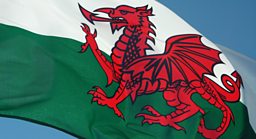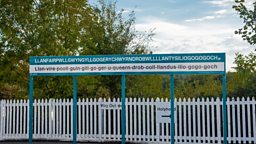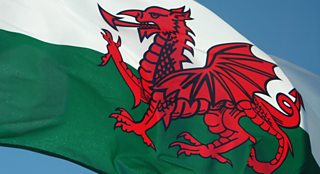Seven Welsh words that are well worth knowing
St David’s Day is the perfect excuse to take a look at the delightful complexities of the language of Wales. Welsh comedian and film reviewer, Gary Slaymaker does the honours.
When you’ve been raised with Welsh as your first language, there’s a tendency to take the rich tapestry of the speech for granted. But not only do North and South Wales have different words for the same exact term, there are also dialectic variations throughout the country. So, with all that in mind, here are seven Welsh words that should see you at least be able to kick start a conversation somewhere in Wales.

1. BORE DA (Boh-ray Dah)
We start with a universally accepted phrase of welcome: “bore da” (Good morning!). Even if you’re in the foulest of moods or have the meanest of dispositions, it is virtually impossible to say “bore da” without it sounding like a cheery and friendly greeting. For example – “Bore da: here is the new Muslim ban we’ve been working on.”
'Popty ping' is not the Welsh term for the microwave oven, sorry.
2. FFWRN MEICRODON (Foo-rhn May-kro-don)
Let’s get the myth out of the way now. “Popty ping” is not the Welsh term for the microwave oven, sorry. A literal translation would be “the oven that goes ping”, which, while being very Pythonesque, and incredibly funny, isn’t actually true. The Welsh word for microwave is “meicrodon” – “meicro” being Welsh for micro, and “don”, the mutated word for ton (tohn), literally means wave. And “ffwrn” just means oven. I know. Dull, isn’t it?
And on the same subject, the Welsh word for jellyfish is not “pysgodyn wibli wobli” (puh-skod-in wibbly wobbly), or, in English, wibbly wobbly fish. Lord alone knows what comedian came up with that one, but it’s fairly new in the lexicon of non-existent Welsh words. For many years, the official Welsh term for the jellyfish was “cont y môr’, academics have recently changed it to “sglefren fôr” (skle-vren vore = sea skater).
3. SBIGOGLYS (Sbee-Gog-Liss)
The Welsh have always been a creative bunch when it comes to naming fauna and flora, but there’s a simple and joyous beauty to the word “sbigoglys” as the translation for spinach. Whether it’s the saag bhaji at your local Indian restaurant, or fine dining at 5-star establishments, the word “sbigoglys” takes a lot of the pretentiousness out of the culinary environment. For dessert, you could also order yourself a peach melba in Welsh. Melba is just “melba”, but the peach is known as the “eirin gwlanog” (ay-reen glan-og) – literally translated as woolly plums.

4. HEMO, WADO, CLATSHO, STÎDO, LEINIO (Hem-oh, Wad-oh, Klat-show, Steed-oh, Lay-nee-oh)
Like all Celtic tongues, Welsh is the language of the angels; with its rhythm, lilt, bounce, and languid poeticism. That’s not to say that we haven’t a touch of the devil in us too, as the words in this example are all dialect descriptions of fist-fighting – in essence the equivalents of wallop, belt, thump, and clatter.
M.O.M. is essentially a motion for rapid departure. The sort of thing you鈥檇 hear from two Welsh rugby supporters walking into a pub in the Twickenham area of London.
“Hemo” and “Wado” are definitely West Walian in origin. “Clatsho” is more South Walian in usage, and “Stîdo” and “Leinio” belong to the more feisty residents of North Wales.
These words can often be heard, pitchside, on Saturday afternoons, during local rugby and football matches. Or in the streets of towns and villages on Saturday nights, once the pubs have shut.
5. M.O.M.G.F.G. or MÂS O MA GO FF GLOI (Maas Oh Ma Go Ff Gloh-ee)
So confident are we Welsh in our language, that we can even boil sentences down to acronyms. M.O.M. is essentially a motion for rapid departure. The sort of thing you’d hear from two Welsh rugby supporters walking into a pub in the Twickenham area of London: “Out of here”. The addition of the G.F.G. is for use only in situations of extreme threat, as in two Cardiff City supporters walking into a pub in the Millwall area of London: “Out of here…right f now!”
6. CWDYN (Koo-deen)
I’ve often heard it said that there are no Welsh swear words, but rather, they’re just “Welshified” translations of existing English words. Well, yet again, local dialects are a fabulously rich source of fantastically colourful and highly entertaining profanity. One of the milder words in usage is “cwdyn”; although North Walians prefer the word, “c诺d” (kood). Simply put, this is the Welsh word for bag; but it’s also used as a slang term for scrotum, and by further extension, as a slang term for a person of unlikeable character. For example – “Piers Morgan…Cwdyn!”
7.LLANFAIRPWLLGWYNGYLLGOGERYCHWYRNDROBWLLLLANTYSILIOGOGOGOCH (Nope. Not even going to bother with the phonetic spelling of this one)

No one, and I mean not one native Welsh speaker, uses the full name for this little village on Anglesey in their day-to-day conversations. The only time we ever make full use of the title is when an English speaker asks us, “What’s the name of that place in Wales with the really long name?” Although replying, “Royal Welsh College of Music and Drama, Cardiff”, wears a bit thin after a while.
“Llanfair PG” is the accepted term for the village, and even people from Llanfair PG call it Llanfair PG. Although to be fair, people from Llanfair PG just call it “home”.
My personal favourite has always been the village of Caio (Kye-oh), near the town of Lampeter. An Australian backpacker once asked a Lampeter local for directions to the place. “Excuse me mate, can you tell me how to get to CA 10?” The local shook his head in confusion. “Perhaps that’s the post code for the place,” said the Aussie helpfully. Long story short: he got there, and he’s still living there today.
Celebrating Saint David's Day
-
![]()
A collection of programmes and content to celebrate St David's Day.
-
![]()
Elis James's polemical appraisal of football's role in Welsh identity.
-
![]()
Exploration of the haunting melancholy of Gresford, the Miners' Hymn.
-
![]()
Have a laugh with comedy clips, features and programmes from 成人快手 Radio 4.




